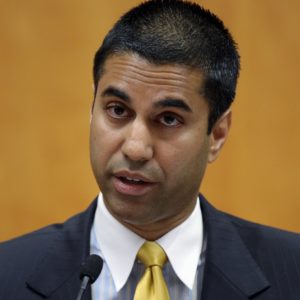The new Republican chairman of the Federal Communications Commission signaled this week he plans to roll internet regulation back to the start, reversing not only its reclassification as a public utility but rules that govern how providers manage web traffic.
In his second interview since taking the agency’s reigns last month, FCC Chairman Ajit Pai told CNBC he’s still examining how best to reverse internet service providers’ (ISPs) reclassification as a Title II common carrier service. The designation subjects ISPs to tougher regulations originally designed to break up telephone monopolies.
Pai voted against reclassification when it was passed under his Democratic predecessor Tom Wheeler in the 2015 Open Internet Order. The order put in place net neutrality rules barring broadband providers from blocking, throttling or prioritizing web traffic — rules Pai suggested he may also seek to undo.
“The end goal is to preserve the free and open internet that we had for two decades starting in the Clinton administration,” Pai said. “That’s a framework that’s served the American public very well and that’s a framework that I hope we’ll be able to return to on a bipartisan basis in the future.”
That could mean returning the internet to its previous classification as an information service subject to Federal Trade Commission oversight, which regulates practices harmful to consumers after the fact instead of prescribing rules upfront. Pai might also see it as necessary, since federal courts threw out the FCC’s efforts to enforce net neutrality rules without Title II reclassification, upholding the rules only after they included Title II.
“We’re studying the issue very carefully and speaking to members of Congress who might have an interest in this as well,” Pai continued. “The proof is in the pudding that the consumer was best served with light-touch regulation and that’s the end result we’re hoping to achieve.”
Net neutrality rules could instead come via legislation by Republicans in Congress. Chairman of the Senate Commerce, Science and Transportation Committee Sen. John Thune was working on a bill to codify the rules into law, minus Title II, when the FCC moved ahead with its own proposal.
While Democrats have vowed to fight any effort to dismantle existing internet regulation, Thune said in January the threat of FCC repeal could bring lawmakers on the left to the table.
Pai has repeatedly expressed his willingness to defer to Congress on the issue he considers outside of FCC jurisdiction. In a Thursday press conference following the agency’s February open meeting, the chairman said he had no problem with Republican lawmakers using the Congressional Review Act to wipe off the books net neutrality privacy rules passed by the FCC in October. The act bars the agency from passing substantially similar rules in the future.
But his deference to Congress hasn’t stopped Pai from making moves on his own. As soon as he was in the big chair, Pai closed the FCC’s investigation into zero-rating, a potential net neutrality violation the previous administration accused AT&T and Verizon of breaking. On Thursday he passed a motion to block net neutrality transparency rules for smaller broadband providers.
For two meetings in a row Pai has declined to “make news” on how he’ll approach or enforce aspects of the previous administration’s internet regulation, saying only he’s considering the “full range of options.”
Messaging from congressional Democrats and a hefty dissent yesterday by the FCC’s only remaining Democrat, Commissioner Mignon Clyburn, indicates Pai is unlikely to get the bipartisanship he seeks.
“At a time when the majority of the commission is talking about gutting these broader rules, I cannot in conscience support this vastly increased exemption without knowing what core protections will remain in place for consumers and small businesses in the years to come,” Clyburn said.

